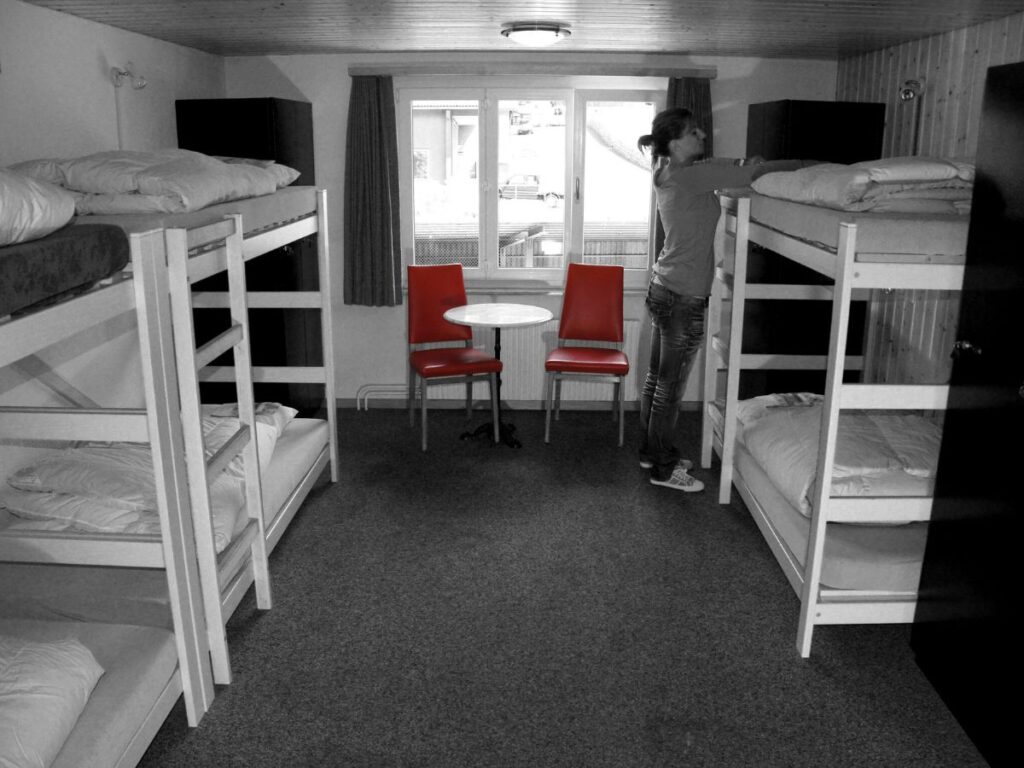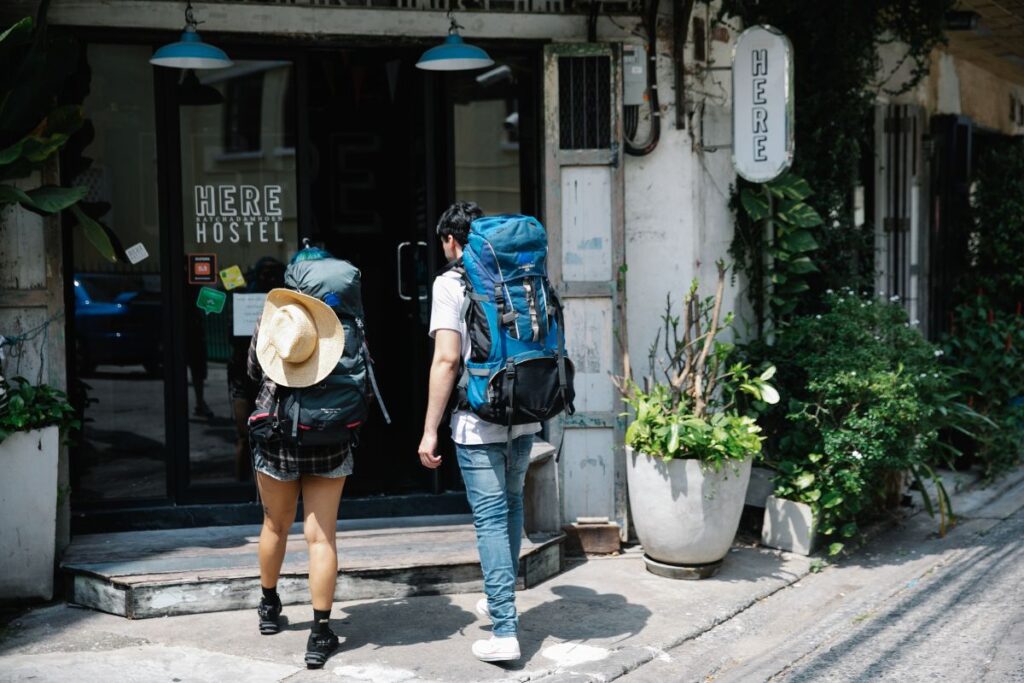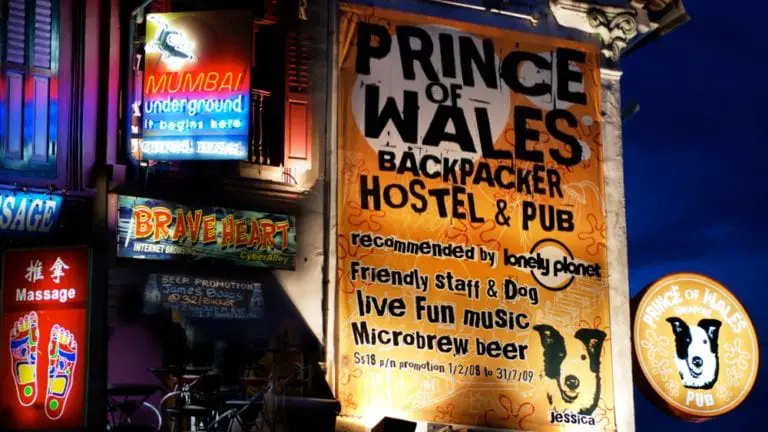There are several strategies you can employ to find the best budget accommodation and there’s something to be said for each of them. In this section we look at the pros and cons of four of the best ways to go about your hunt for a cheap night’s sleep.
Table of Contents
Finding Backpacker Hostels – The 3 Main Strategies
1) Use a Hostel Booking Site

Booking a bed online is very simple and you often only pay a small deposit with the rest to be paid to the hostel on arrival/departure. There a few hostel booking sites out there with hostelworld and hostelbookers the most popular.
Even in medium sized towns and cities there can be hundreds of different options when it comes to finding accommodation. Another option is to use trivago which compares prices across different booking sites. Hotels sometimes have special offers on allowing you to enjoy a little bit more luxury for a comparable price to that of a bed in a hostel. As with most things shopping around generally results in you getting the best deal to suit your needs and preferences.
Advantages: Peace of mind that you have somewhere to stay when you arrive in a new place. It also gives you the chance to read reviews of other travellers and compare the competition before deciding where you stay. Often prices are actually cheaper booking online than they are arriving in-person at the hostel.
Disadvantages: It can be a pain to be constantly booking hostels if you’re moving to a new place every other day. In poorer countries most of the budget accommodation options don’t have an online booking facility.
Where does it work best? Europe, Oceania and in big cities all over the world. It’s a good idea to book in advance if it’s a large city and you know there isn’t a single area where most of the budget accommodation is located (like Khao San Road in Bangkok) that you can just head to. Also during peak and holiday periods this is your best bet.
2) Use a Budget Travel Guidebook
Most decent shoestring guides come with at least a few budget accommodation options for each town, brief descriptions and likely prices. That said good informative guidebooks targeted specifically at budget travellers aren’t plentiful and don’t extend much past the Lonely Planet Shoestring Guides.
The Lonely Planet guides are pretty reliable provided you buy the latest edition although if it has been a while since the last update, you can’t always rely on them as hostels open up and shut down all the time. If you’re not a fan of Lonely Planet then Rough Guides provide a decent alternative.
Advantages: There’s no hassle in terms of booking accommodation all the time and you can just rock up in a new town and select one of the the options in your book. Most guides also include maps so you can often get to your hostel on foot rather than paying for a taxi.
Disadvantages: Unless you have a very upto-date guide then you can haul yourself and your backpack half-way across a city only to find the ‘best hostel in town’ no longer exists. You can also fall into the trap of blindly following your guidebook which isn’t really what travelling is about. Many travellers follow this strategy and will probably have the same guidebook so the recommended ones will fill up quickly.
Where does it work Best? Advisable in poorer countries (where internet-use isn’t as widespread) and those that don’t have a huge backpacking scene. In places like Southeast Asia, Africa and most of Latin America, it’s certainly better to go down this route rather than booking online as most budget accommodation choices aren’t listed on booking sites.
See Should you take a Guidebook? for more Pro’s and Con’s.
3) Just go with the Flow
Those who view travel as an adventure prefer this approach! Where you stay will depend on the people you meet and your own judgements rather than the opinions of a poncy travel-guide writer who visited the town for 48 hours several years ago.
Advantages: You can suss out and get a feel for the town before making any decisions and can pick somewhere that takes your fancy rather than someone else’s. You also have the chance to actually view the room or dorm before committing to pay for it.
Disadvantages: Rocking up without anything sorted or any plans can leave you searching the town for a cheap bed if you arrive at a busy time. This can also often work out to be the most expensive approach unless you’re very good at bargaining and have a good grasp of the local language. Many hostels prefer advanced bookings and offer discounts to people willing to do so.
Where does it work best? Areas very popular with travellers where accommodation is plentiful such as the Thai islands (except during Full Moon parties when advanced booking is sensible). You will also benefit from this approach in cities such as Bangkok or Ho Chi Minh City that have a well-known backpacker district and during the off-season you can sometimes secure special deals as they’re desperate for custom.
Find a Place to Stay for Free
Couchsurfing
Couchsurfing is an excellent way to save money on travel. Many travellers swear by it, many more are too scared to try it. Give it a go and you might just catch the bug!
Advantages: It’s free and you get to actually meet and spend time with a local person as opposed to sharing a dorm with the repetitive hordes of drunk backpackers. If you strike it lucky and get a nice host who’s not only willing to let you stay but show you around their town then couchsurfing can be fantastic experience.
Disadvantages: It’s a bit hit-and-miss. Finding hosts at short-notice is often difficult and arrangements can fall through. You also need to build-up a positive reputation before hosts are likely to let you stay. Homes tend to be in residential areas (obviously!) so you’ll normally have to travel if you want to see the more interesting districts.
Where does it work best? Just about anywhere such is the size of the global couchsurfing community but it’s generally most worthwhile in more expensive parts of the world. Big cities in Europe or North America have the most active couchsurfing scenes but there are plenty of potential hosts in the most unlikely of places these days. If you’re attempting something like our Scandinavia backpacking route as a budget traveller, you’d certainly be wise to consider it.
Couchsurfing Tip – A good way to get positive references is to invite your friends to join and add you or to start by meeting people via their hangouts app. This is safer for both parties and might get you a reference if you behave and ask nicely. You can even consider offering your couch or showing travellers around your home town before you set off on your travels. If you are a guy, you’ll struggle to find a bed in many places with a profile that is barely filled out and has no references.
Camping
Camping is one option to sleep for free or very little if you opt for the added security of a campsite. Pack a small tent into your backpack and hit the road. In most parts of the world no-one is likely to seriously object if you find somewhere discrete to camp out for the night. Risks obviously vary greatly depending on where in the world you are so do your research.
If you don’t want to to carry a tent around for your whole trip then consider hiring or buying a cheap one for a week or two when you are in an area that is good for camping. You can often leave many of your belongings in storage in a hostel in a city for several days or weeks if you need to free up some room in your backpack. This strategy works well on our Patagonia backpacking route, a region where hostels can be very expensive during peak season but also where there are lots of amazing natural spots to camp.
Volunteer

Volunteering in a hostel or something similar will also often get you a bed and sometimes food. Beware though of the volunteering schemes that charge you huge amounts to work. Many are exploiting people who simply want to help those less fortunate. It is probably better to wait till you arrive in a country and then look for volunteering opportunities. Many hostels will take you on even if you can only commit to a few weeks.
Alternatively we’d advise registering with Worldpackers (see above), a great platform for finding work placements around the world in exchange for free food and accommodation. Find out why you need to travel with Worldpackers now!
Save on a Single Night’s Accommodation
If everything else fails and you are travelling on the tightest of budgets, airports and many train stations are normally open 24-7 and are okay to get a few hours kip in, some even have showers. Also take advantage of night buses and night trains when possible as this will save you the cost of a night’s accommodation. Any trips over 8 hours are probably worth doing overnight.
In Conclusion….
There are times when you will benefit from each of the options we have discussed with regards to how to find cheap accommodation when backpacking. Using them at the right moment will help cut down the overall cost of your trip.
If you’re a first-time backpacker then a combination of making online hostel bookings and carrying a guidebook is the safest option and will ease you into the travelling lifestyle.
As you become more experienced and more confident on the road then chances are you’ll adopt more of a ‘go with the flow’ approach and once you’ve got sick of the hostel crowd then you might fancy doing a bit of couchsurfing, volunteering or camping.
This page was last updated in June 2019.
Featured Hostel Image, CC BY-SA 2.0


Thank you for this amazing post. I am a travel blogger from Pakistan, this will surely help me a lot.
I read about couch surfing and learnt that it’s a great concept of travelling around the world and meeting new people and making new friends as well as learning a new culture. I therefore want to take advantage of this opportunity to access the world.